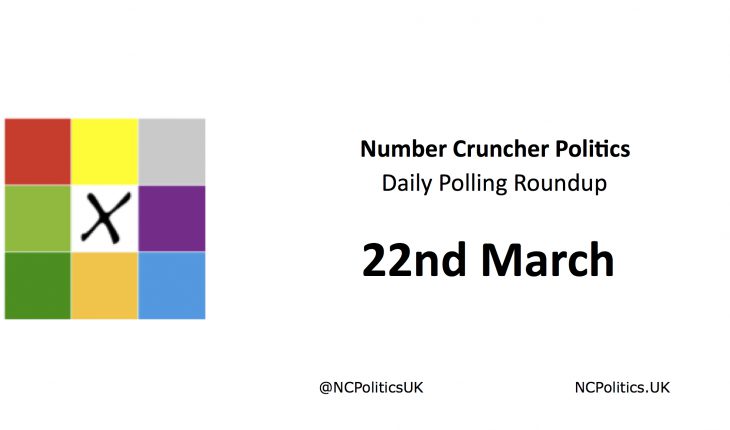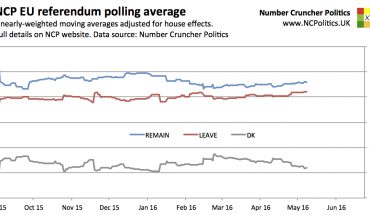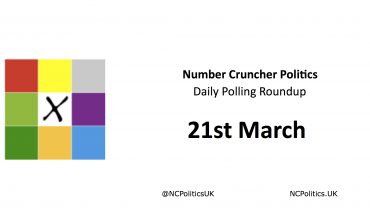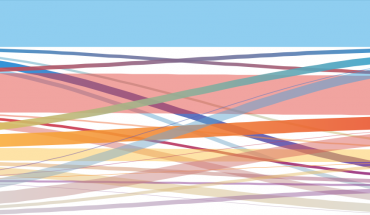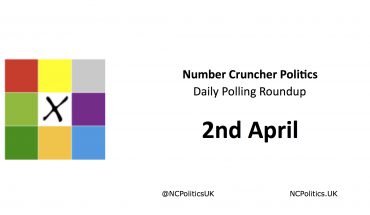As I wrote last night, we’ve now had a range of polls in since the budget. The three released yesterday were all conducted after the budget speech (in the case of YouGov and Survtion, quite a while after. For those new to pollwatching, it’s important to remember when comparing polls from different pollsters, that there are systematic (methodology-related) differences called house effects – in other words, the differences between results that pollsters find that isn’t due to random variation or timing.
Opinium‘s poll for the Observer showed a swing to the Conservatives, who opened up a three-point lead, with the move being driven by 2010 Tory voters who had switched to Labour or “Don’t Know” coming home, while some 2010 Labour voters moved into the undecided column. That’s interesting, because it looks like the traditional picture of swing voters shifting between the two main parties, which (for the most part) doesn’t seem to be the case this time. Leader ratings moved in the same direction as voting intention, with David Cameron increasing his approval advantage over Ed Miliband by 3 points (gross and net).
Survation‘s poll illustrated one of the hazards of getting too caught up in small changes. The modern convention in polling is to publish toplines rounded to the nearest integer, and the lead as the difference between these rounded numbers (unlike in the old days, when pollsters including Gallup and Marplan used to publish halves and even decimals). Mathematically speaking, rounding should only be done as a final step, but there’s a good reason for pollsters using rounded numbers – people obsess about tiny movements enough anyway, without the added encouragement of decimal places. This poll had unrounded VI figures of CON 29.7 LAB 34.3 (a 4.6 point LAB lead), whereas their last national poll for the Mirror had CON 28.3 LAB 33.7 (a 5.4 point LAB lead). So if we round as a final step, both Survation polls show Labour 5 points ahead, but the headlines show 4 and 6 points respectively. So essentially the change is entirely due to rounding.
Survation also asked people which parties they’d consider voting for. The figures look high – 54% would consider voting Labour, 48% would consider voting Conservative, but the true ceilings are of course far lower for both parties, because the positions and policies that might attract one waverer might repell another. Similar numbers would consider the Lib Dems (34%), UKIP (33%) and the Greens (30%) – surprisingly similar numbers considering how different their toplines are in this poll. For the two largest parties, 18% of those intending to vote for each would consider voting for the other, in theory a swing of 5 or 6% is possible, but inplausible for the same reason as above. The crossbreaks for the other parties are interesting, but far too small to put any weight on.
YouGov is the only pollster to have polled twice since the budget, first showing an apparent bounce, then swinging the other way to show a two-point Labour lead just 24 hours later. That suggests either that there was a genuine but very short-lived budget bounce, or that one or both of the post-budget polls reflected statistical noise. Thankfully YouGov polls five times a week, so we won’t have to wait too long for some more clues.
The approve/disapprove questions continued an interesting trend – I’m not sure if it’s the election or the weather or simply everyone being in a good mood, but apart from “The government”, all numbers for everyone and everything showed an improved on last weekend. That includes the coalition, all three party leaders, the chancellor, the economy and household finances. Looking at the spreads between David Cameron and Ed Miliband, the gross and net measures are very close to their averages for 2015 so far, or put another way, the are going up in synch. Until such a time as these gaps close, or the Conservatives open up a topline lead, expect the debate about the leader ratings/voting intention disparity to continue.
So with the picture remaining mixed, and taking everything into account, there’s no sign of a sustained budget bounce. In addition to the conventional polls, we also got the ICM/Telegraph Wisdom Index, which is based on public predictions of the outcome. This method seemed to do a good job in 2010, but without a longer and broader track record, it’s hard to know how to interpret it. Besides a substantial Lib Dem recovery, it’s showing pretty much the same picture as regular voting intential. See this journal article by Martin Boon for more information on the index.
ICM/Telegraph (wisdom index): CON 32 (=) LAB 31 (=) LIB 14 (+1) UKIP 13 (=) Dates 18th-20th N=2,002 Writeup http://t.co/zcpDWzGhRO #GE2015
— NumbrCrunchrPolitics (@NCPoliticsUK) March 22, 2015
And finally:
"Even the opinion polls seem to admit at last that they don't know." Video of 1964 election, scuffles in Leicester Sq…http://t.co/cEYcFTeUSs
— May2015 (@May2015NS) March 22, 2015
Monday as always is a busy polling day, with Populus online in the morning, Ashcroft at 16:00 and then YouGov at 22:30. Additionally, Tom Clark has tweeted that ICM has a Scottish poll in the works for the Guardian, though the publication date is TBA.

